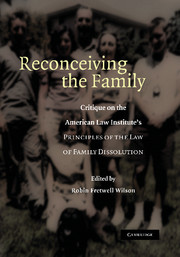 Reconceiving the Family
Reconceiving the Family Published online by Cambridge University Press: 25 January 2010
During the last quarter of the twentieth century, the long “welfarist” era stretching from the Enlightenment seemed to be being displaced by a dual-track strategy proclaiming the promotion of individual empowerment and responsibility. The drive for empowerment is seen in the increasing significance of the discourse of rights, which has undermined, or at least destabilized, the institutions through which welfarism operated. This destabilization in turn set up a new problem of the legitimacy upon which the rights-claims and related responsibilities were grounded, for if institutions, such as marriage or parenthood, lose their authority as sources for rights and obligations, it is necessary to find an alternative basis for their binding force. This chapter assesses how far the Principles and some recent developments in English family law fit in with this picture, and, if they do, how they seek to resolve the problem of legitimacy, that is, the source of authority for such rights and obligations. This chapter concludes that they do broadly fit the picture. The approach to the legitimacy problem is hard to characterize. This chapter suggests that the Principles seem to approach the question of legitimacy through a method which, for want of a better term, this chapter calls the “balance sheet” approach. This chapter also offers a view about this method.
Compensatory Spousal Payments and Division of Property
This part examines the ALI approach to alimony and property division and contrasts it with the approach taken in England and Wales.
To save this book to your Kindle, first ensure no-reply@cambridge.org is added to your Approved Personal Document E-mail List under your Personal Document Settings on the Manage Your Content and Devices page of your Amazon account. Then enter the ‘name’ part of your Kindle email address below. Find out more about saving to your Kindle.
Note you can select to save to either the @free.kindle.com or @kindle.com variations. ‘@free.kindle.com’ emails are free but can only be saved to your device when it is connected to wi-fi. ‘@kindle.com’ emails can be delivered even when you are not connected to wi-fi, but note that service fees apply.
Find out more about the Kindle Personal Document Service.
To save content items to your account, please confirm that you agree to abide by our usage policies. If this is the first time you use this feature, you will be asked to authorise Cambridge Core to connect with your account. Find out more about saving content to Dropbox.
To save content items to your account, please confirm that you agree to abide by our usage policies. If this is the first time you use this feature, you will be asked to authorise Cambridge Core to connect with your account. Find out more about saving content to Google Drive.